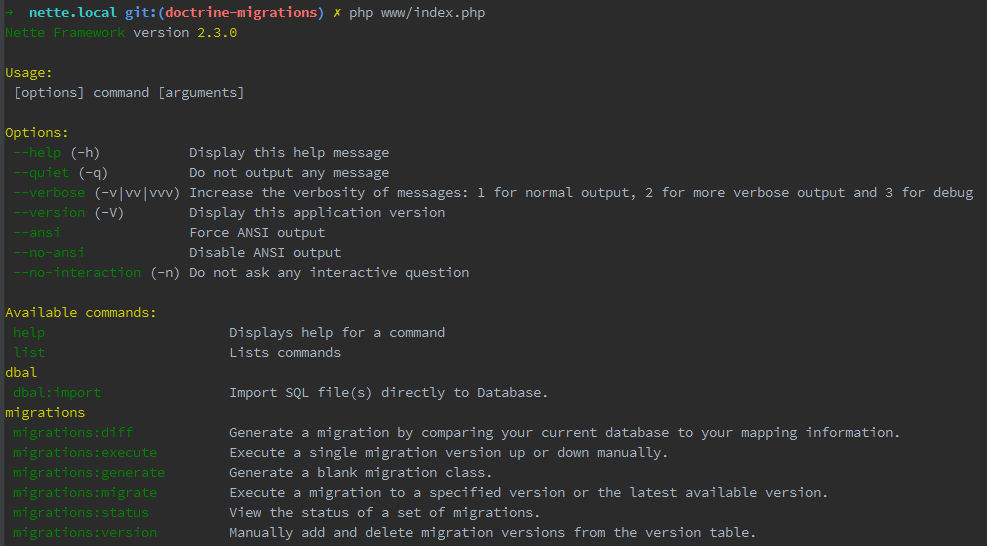symplify / doctrine-migrations
Implementation of Doctrine Migrations to Nette
Installs: 4 996
Dependents: 0
Suggesters: 0
Security: 0
Stars: 0
Watchers: 3
Forks: 1
pkg:composer/symplify/doctrine-migrations
Requires
- php: ^7.1
- doctrine/migrations: ^1.4
- nette/di: ^2.4
- symfony/console: ^3.2
- symfony/event-dispatcher: ^3.2
- symplify/package-builder: ^1.4
- symplify/symfony-event-dispatcher: ^1.4.0
Requires (Dev)
- kdyby/console: ^2.6
- kdyby/doctrine: ^3.1
- kdyby/events: ^3.0
- nette/bootstrap: ^2.4
- nette/reflection: ^2.4
- phpunit/phpunit: ^6.0
- tracy/tracy: ^2.4
This package is auto-updated.
Last update: 2022-03-08 10:48:49 UTC
README
Implementation of Doctrine\Migrations to Nette.
Install
composer require symplify/doctrine-migrations
Register extensions in config.neon:
extensions: - Symplify\SymfonyEventDispatcher\Adapter\Nette\DI\SymfonyEventDispatcherExtension migrations: Symplify\DoctrineMigrations\DI\MigrationsExtension # Kdyby\Doctrine or another Doctrine integration doctrine: Kdyby\Doctrine\DI\OrmExtension
Configuration
config.neon with default values
migrations: table: doctrine_migrations # database table for applied migrations column: version # database column for applied migrations directory: %appDir%/../migrations # directory, where all migrations are stored namespace: Migrations # namespace of migration classes codingStandard: tabs # or "spaces", coding style for generated classes versionsOrganization: null # null, "year" or "year_and_month", organizes migrations to subdirectories
Usage
Open your CLI and run command (based on Kdyby\Console integration):
php www/index.php
And then you should see all available commands:
Migrate changes to database
If you want to migrate existing migration to your database, just run migrate commmand:
php www/index.php migrations:migrate
If you get lost, just use -h option for help:
php www/index.php migrations:migrate -h
Create new migration
To create new empty migration, just run:
php www/index.php migrations:generate
A new empty migration will be created at your migrations directory. You can add your sql there then.
Migration that would add new role "superadmin" to user_role table would look like this:
namespace Migrations; use Doctrine\DBAL\Migrations\AbstractMigration; use Doctrine\DBAL\Schema\Schema; /** * New role "superadmin" added. */ final class Version20151015000003 extends AbstractMigration { public function up(Schema $schema) { $this->addSql("INSERT INTO 'user_role' (id, value, name) VALUES (3, 'superadmin', 'Super Admin')"); } public function down(Schema $schema) { $this->addSql("DELETE FROM 'user_role' WHERE ('id' = 3);"); } }
Simple as that!
For further use, please check docs in Symfony bundle.
Features
Migrations organization
If you have over 100 migrations in one directory, it might get messy. Fortunately doctrine migrations can organize your migrations to directories by year or by year and month. You can configure it in your config.neon (see above).
/migrations/2015/11
- VersionXXX.php
/migrations/2015/12
- VersionYYY.php
/migrations/2016/01
- VersionZZZ.php
Injected migrations
Note: this is not really best practise, so try to use it only if there is no other way.
namespace Migrations; final class Version20140801152432 extends AbstractMigration { /** * @inject * @var Doctrine\ORM\EntityManagerInterface */ public $entityManager; public function up(Schema $schema) { // ... } // ... }
Contributing
Send issue or pull-request to main repository.

